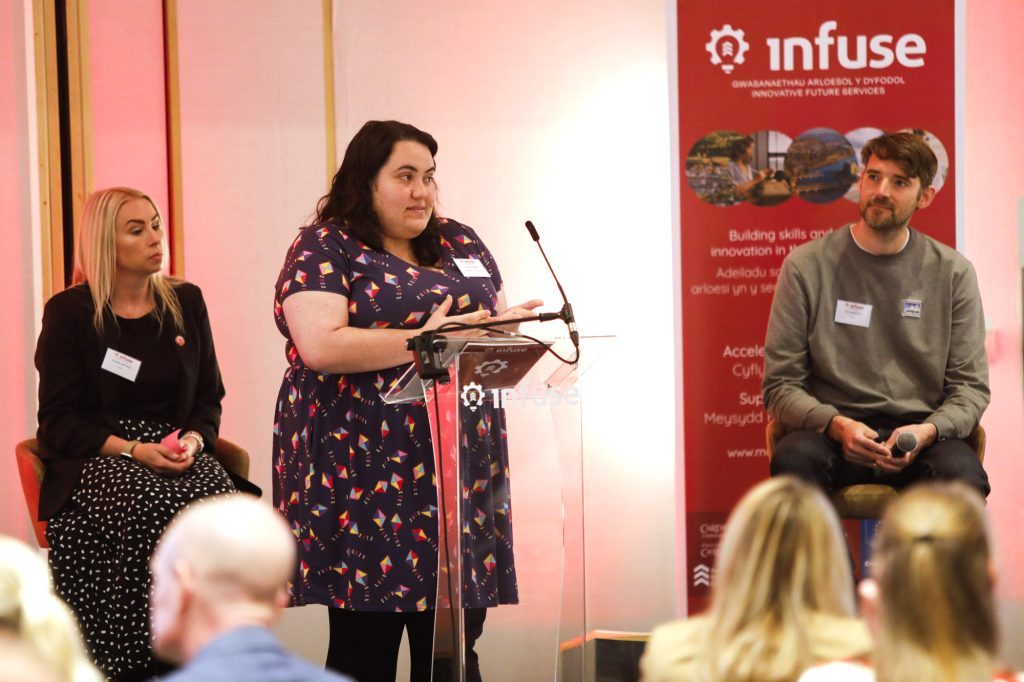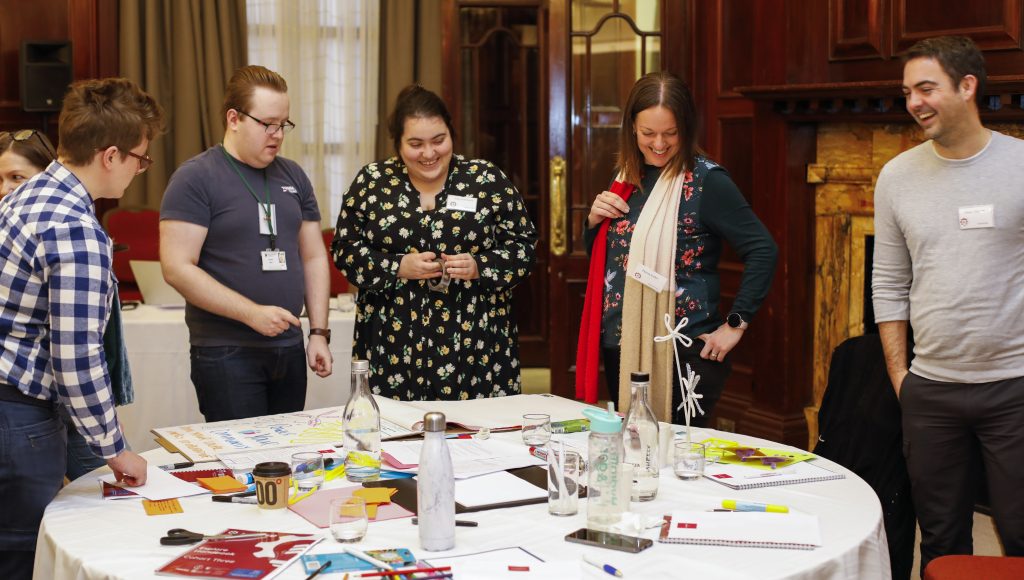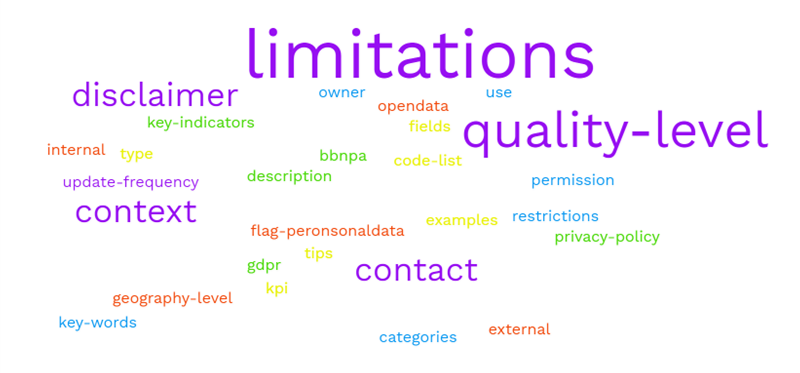What was the overarching challenge?
Amy identified that Monmouthshire County Council (MCC) is a data rich organisation, but that knowledge of the data held, its strengths and weaknesses, is not widespread across the organisation. Conversations with fellow Infuse participants, especially during the data lab part of the programme, deepened her understanding of the challenge. She recognised the important role data was going to need to play in almost all of the participants’ experiments, and the barriers they faced when this wasn’t readily available. She hypothesised that in Monmouthshire, this may be acting as a barrier to more innovative practice.
“For staff to be encouraged and empowered to innovate within an organisation, they need easy access to the data which can enable them to meet their outcomes. Data was important for understanding all the challenges within the two Infuse themes (accelerating decarbonisation and supportive communities), it’s an asset when used well, but not having access to the correct data can be a barrier.”

Amy Pritchard
Geographical Information Systems (GIS) Officer, Monmouthshire County CouncilAmy decided to explore whether the introduction of a metadata catalogue, providing a structured inventory of the datasets the council holds, with key information about each dataset, could help.
Which aspects of the challenge were addressed in the experiment (the research questions)?
Amy gave serious consideration to what was in her sphere of influence, and decided to test whether a metadata catalogue, setting out the data available across the organisation, its characteristics, strengths and weaknesses, would be a helpful step in enabling staff to find and access data. During her time on the programme she sought to answer two questions in relation to this:
(1) What opinions do staff hold on data accessibility?
(2) Would a metadata catalogue help?
She also tested a third question on methodology:
(3) Are structured conversations more useful than unstructured ones in generating usable outputs?
“My role and team within Monmouthshire have influence over the accessibility of data. We can support the organisation to develop the data foundations and infrastructure it needs to encourage and empower staff to innovate. The first step to addressing any challenge is to understand it. I have chosen to gain a better understanding of staff opinions on data availability. Data is knowledge, if data is not available it can act as a blocker for those trying to work toward solving any challenges, including those within the two overarching Infuse themes.”
What was done to address the challenge?
Amy decided, given the amount of time she would have to experiment, to focus on deepening her understanding of the problem and then beginning a conversation about whether a metadata catalogue might be helpful in solving it, rather than jumping straight in to developing a prototype. She started with desk research, looking at data maturity as a concept (more on this in the next section) and at different approaches to making data more accessible across an organisation. She then began engaging with colleagues, carrying out a series of initial, unstructured conversations, followed by 10 structured interviews.
Amy engaged staff in a variety of departments -Placemaking, Highways And Flood’and the Data Insights Team – to gain their opinions on current data availability and accessibility within MCC. During these sessions she demoed an example metadata catalogue implemented in Bristol and asked staff to reflect on whether they could see this being of use to them and their team. A key focus was to understand how staff may use the product, to help shape the prototype in the next phase of the work, and ensure it would be beneficial and meet their needs.
Amy’s work is typically based on quantitative data, but the data lab made a case for the usefulness of qualitative data, which prompted Amy to take a different approach. In qualitative research, it is common for interview questions to be refined and re-shaped as work progresses and themes emerge, and Amy’s work reflected this.
“The set of questions I’d initially planned slightly changed and became more refined after my first couple of interviews. Initially my first questions were quite broad and would prompt generic replies, by focusing these down slightly I was able to maintain a better link between questions while keeping a natural flow to the conversation. I added in new questions to focus in on possible trends, one of these new questions was ‘Do you use generic accounts or go directly to a contact?’. This question was added as it appeared clear that staff’s opinions on how easy they found access to data differed based on their network.”
Which aspects of Infuse were most helpful in addressing the challenge?
With the data-focused nature of her experiment, Amy drew in particular on the tools introduced through the data lab. One of the key messages of the data lab is that public bodies need to proactively create the right conditions for data innovation. The lab looks at this through two lenses; openness to learning and data maturity. Amy’s experiment fell solidly within the realms of data maturity, and the data maturity tool (page 104) that the data lab introduced served as a jumping-off point for Amy’s experiment, prompting her to further explore this area independently and think about how she might directly influence Monmouthshire’s level of data maturity.
“I came across the Data Maturity Framework for Government which includes the topic ‘Knowing the data you have’. Three of the four elements within this topic were core to my challenge:
- Ensuring findability of data
- Recording the data you hold and ensuring people can access it
- Keeping good metadata”
In addition, Amy found the LOTI data project methodology helpful in narrowing the scope of her project to ensure she was working towards a valuable outcome, and used the ODI data ethics canvas to shape her thinking around any ethical implications of increased data sharing.
“Throughout the infuse programme we were taught many useful tools. I feel I’ve benefited not just from the content but the way in which the sessions were delivered. Infuse provided amazing support and a space to take a step back and try things a different way. I valued the opportunity given to us, we were given a variety of support from specialised coaches who were always on call. The reverse mentoring element of the programme demonstrates the respect the programme has. It’s rare in many public sector organisations to be given a similar opportunity. I am very grateful for the time my reverse mentor spent and their insights into my project were invaluable.”
Learn more in the the Infuse Handbook >
What were the main lessons from collaborative working?
Over the course of the programme, Infuse delivery staff have developed an understanding of collaboration that incorporates two types – collaboration in learning and collaboration in doing. Collaboration in learning is where people with a shared challenge come together to explore it, but do not necessarily test out the same intervention to try and make progress against it. Although Amy didn’t collaborate directly with other associates on the experiment, her experiment idea was significantly shaped by her engagement with them in both lab-based learning sessions and experiment coaching sessions.
“Throughout the Infuse programme I’ve really enjoyed engaging with associates. I’ve been exposed to new areas that I wouldn’t interact with usually. I’ve valued these opportunities to broaden my knowledge of the core themes and learn more about current issues and how data availability may impact these.”
Key findings
Amy summarises the key findings from the experiment into three key points:
- Easy access to data at MCC is currently influenced by who a person knows and their own built networks. There are already data networks in place, we should be ensuring these key data owners are supported, then signpost to them so employees don’t need to rely on personal relationships to enable them to access data.
- Data Owners want to be able to share contextual information and limitations about their data. Providing a place for staff to do this will help encourage data sharing but also help to ensure others are using it correctly.
- It is important to engage with staff to gather qualitative data. Structured conversations can be a useful way to do this, providing more valuable outputs than unstructured ones.
Data accessibility
The first of Amy’s research questions focused on understanding staff experiences in relation to data accessibility; ‘What opinions do staff hold on data accessibility?’.
Responses varied quite substantially, but a key theme was that staff rely heavily on their own networks to access the data that they need, rather than generic accounts or official systems. This was particularly challenging for newer members of staff who do not have these networks in place. The success rate regarding gaining access to the right data was heavily dependent on the data literacy and data skill resource available within the requesting team.
Amy found that a key barrier to systematic data-sharing was individual teams’ concerns over the quality of their data, and possible lack of opportunity to have a conversation about its limitations should an automated process for accessing data be established.
“I received insightful responses that highlighted some of the reasons owners may be worried about sharing data. This ranged from owners who were worried that users would use the data incorrectly or don’t consider what errors may exists in the data to others who knew that users don’t understand their code lists.”
The usefulness of a metadata catalogue
The second research question was ‘Would a metadata catalogue help?’ Amy did not come across any resistance to the idea of a metadata catalogue, staff understood the reasons for it, and providing the example from Bristol helped potential users envisage how they might personally use and contribute to it.
“The most valuable question I asked to staff during my interviews was ‘What would you want others to know about your data?’ The core theme throughout all responses was that owners wanted a place to provide context and list limitations. Providing the opportunity for staff to include this information or add a disclaimer appeared to be the best way to remove some barriers. It would give owners control over what users know about the data and allow them to mitigate concerns they have with sharing the data.”
Responses to ‘what do you want people to know about your data?’
Structured vs unstructured conversations
Amy sought to answer the methodology-based question ‘Are structured conversations more useful than unstructured ones in generating usable outputs?’ She found that unstructured conversations often veered off topic and end up losing their flow. Although still being a helpful conversation, it was hard to compare each conversation. By contrast, the structured conversations resulted in a clear flow in the conversation, and that even if these diverted slightly, the diversions were more likely to remain relevant to the conversation.
“I was able to gather answers for all questions within all my interviews using a structured conversation. I could easily compare answers to gain a greater understanding of a single topic and pick out any trends across staff.”
Next steps
In the immediate term, Amy will use her findings so far to shape the next stage of her work, which is to develop and test a prototype. She will begin by cataloguing the GIS metadata her team is responsible for as a first prototype, incorporating more datasets as she moves through the testing process.
Having initially interviewed staff in her immediate network, she will seek to test the prototype with a broader audience within the council, utilising the interview schedule that she developed and refined during this first stage of the process.
At this second stage, Amy will also be working with her counterpart at neighbouring Newport County Council.
In the longer term, MCC is in the process of developing a data strategy for 2023 to 2028. Amy’s Infuse experiment enabled her to actively shape the action plan associated with the strategy, with ‘Improve how we use our data by making it more available and accessible’ included as one of the strategy’s key aims.
“This aim is closely linked to my project, it provides the strategic validation that this is an area we need to invest time in as an organisation. The implementation of a metadata catalogue will be included as an action under this aim. The inclusion of this in our strategy gives me the direction and platform to continue this work post-Infuse.”




